#9: Are you a gworl?
Our takes on four internet archetypes: the bruh girl, the girlie, the girlboss, and the gworl.
pov: you’re fabulous and a slay! listen while reading for best experience.
K: Cam and I were having drinks (i.e., stealing Sandra’s) at Silk Club’s zine release party last weekend, where we both agreed that we were surrounded at the event that night by bona fide ✨ gworls ✨ — we just had no idea what the hell that actually meant. According to the internet, a (material) gworl is “a girl who is fabulous and a girl who is a slay,” which is totally the tea but ontologically unhelpful.
We wondered drunkenly: What exactly constitutes “gworl” behavior? Is gworlhood merely a social identifier or is it a philosophical way of life? What does someone who practices gworlism do or wear? What do they believe? And if we were there that night...were we gworls??? 😵💫
E: It’s true—K and I’s love language is perception. Our three years of friendship culminates into perfectly capturing each other’s essence with a hex code (in this season, she’s jade green and I’m light blue), a cartoon (princess bubblegum and marceline, always), and dog-earred pages in books we borrowed from each other. So, you can see why this topic interests us so much!
To be sure, there is a fine line between perception and comparison. But I don’t believe archetypal labels are intrinsically a societal fuse to pit women against each other, and this is coming from a girl who used to make sure each one of her posts had 20+ comments (and not including replies!). I indulged in toxic comparison long before internet words entered my vocabulary.
Anyway, before we get into the nitty-gritty, here’s a fun way to tell which archetype you are: look at your comment section. There is a difference between “the cutest” (girlie girl), “gorg” (hot girl), “slay” (gworl), and “insert inside joke here” (bruh girl). There’s room for interchangeability, of course, but seeing the progression of mine through the years, and the degree to which I obsessed over it, is almost like a silly little personal milestone for me.
the bruh girl
what the internet says:
A girl who rejects certain aspects of traditional femininity, placing value on their senses of humor rather than their appearance. (source)
K: She’s crass, she’s candid to a fault, and she’s not afraid to be the worst version of herself if it means someone will laugh when she recounts her latest disaster. The “bruh girl” is, according to pop culture, a character who swears by beer and pizza, calls herself “one of the boys” because she can’t handle the drama (re: emotional responsibility) that comes with female friendships, and whose sanity is hanging by a veeeery thin tether. Mine was, anyway. My “bruh girl” era was more or less a corporeal manifestation of the weedy 3-AM line at Jendy’s (or, as I prefer to call it, the Purgatory of West Campus).
I think a huge misconception about bruh girls is that they’re chill people. I would argue this archetype is actually one of the most emotionally defensive, the most socially anxious, and the least at peace with itself. Barely contained hysteria — a culturally perceived feminine emotion — practically radiates from these girls-who-don’t-want-to-be-girls, rolling off their slouchy backs in waves, curling like smoke from the hands they tuck uncaringly under their armpits or shove into the pockets of their gray sweatpants. They roll their eyes around, use the word cunt like it’s a weapon, and much like a crazy person, can’t show affection without hitting or insulting you.
I can pretty much peg the bruh girl to one of three personal truths:
Men mean more to her than she’s ready to admit. Not merely their validation or acceptance, but them. She wants to be close to men in a meaningful way without having to occupy the isolating identifier of “woman” to do it — because she senses that men never love women the same way they love one another. There’s a quote about this that I can’t find anymore, but it says something to the nature of, “The emotional intimacies which men demonstrate for other men are numerous and multifaceted: respect, confidence, loyalty, admiration, and mentorship, to name a few. By contrast, their interactions with women are comparatively one-dimensional. She is either someone he protects on the basis of ownership, someone he fucks on the basis of desire, or someone who nurtures him on the basis of maternity.”
She finds her homies’ girlfriends hot. Man, I loved meeting my guy friends’ girlfriends. Not only because I have always naturally gotten along better with girls, but because I loved “flirting” with them. I didn’t know for sure I was into girls until later, but playacting masculinity for these girlfriends (who were often 🥺 girlie types! ugh my favorite!) and hoping they might view me as “one of the boys” kind of drove me crazy. It was like a low-stakes, high-reward, and completely one-sided game, where I got to drape my arm over the back of her chair, compliment her until she glowed, thrill guiltily each time I leaned in to see a picture of her and my homie on her phone, and wave her goodbye at the end of the night from said homie’s passenger seat. No harm done! Both of ‘em none the wiser! But I got to ride home on a cloud and replay over and over the moment I opened a door for her or when she placed a hand on my arm to adjust her heels. Before I had the proper vocabulary to explain my relationship with queer desire (and the nerve to actually take girls out!), I had the labels “tomboy” and “bruh girl.”
She thinks she’s failing at being a girl anyway. So might as well embrace the gracelessness, the chaos, the crudeness of shotgunning a White Claw or wearing the same hoodie all week because you can’t be bothered to get out of bed and shower. Might as well pretend it doesn’t make you cry in the bathroom of a party when you get treated like shit by one boyfriend after another. It’s probably because you’re not pretty enough, not feminine enough, not able to inspire love in boys the same way other girls can because you don’t make the right noises or facial expressions during sex and you are altogether a subpar example of womanhood. Can’t give him what he needs. Aren’t deserving of the tenderness with which you see so many other men handle their women. So lose the makeup. Stop trying. Get sharp around the edges. Pretend you wouldn’t have it any other way.
the 🥺 girlie
what the internet says:
The traditionally feminine, popular girl that values the aesthetic and uses “hiiiii” and “🥺” interchangeably in her daily vocab. (source)
In sixth grade, I was the only girl in my class of 12 boys (I went to a really small school in Beijing). It was the strangest coming-of-age experience. Throughout the year, I cringed when they typed 8⇒ in my calculator, averted my eyes when they bullied the shortest one, and never understood why they were whispering in the back of the classroom. I guess a small part of me wished I could join in, but at the term’s end, when some of the guys confessed that they liked me, I felt girly, I felt pretty, I felt special, and I remember not wanting to ever trade that feeling for a few laughs during class. Plus, I had a huge crush on one of them.
I think I’ve always been a girlie girl at heart. My mom put me in polka-dot dresses from a very young age, and I asked for blonde-haired dolls named Nikki every Christmas up till fifth grade. What solidified my status in middle school, though, was the attention I craved. At my worst, I started acting dumb, because I thought it was the only way to bond with boys, for them to feel important enough to explain how to hold a football or open that can or whatever. Though, sometimes, I did actually want to know how to adjust the shutter speed—asking girls for a favor just felt a little more complicated and required more maneuvering. Guys would find it cute or annoying or both, but they would always answer you, no questions or tally marks.
At my best, I won a lot of chess games (lol). In such a male-dominated arena, boys would let their guard down against a girl, and the power you get from subverting their expectations is unparalleled.
In high school, the girlie girl perception shifted. It was no longer just about dressing up to class or batting your eye at the boy in front of you—it now involved pretty pictures, too. I’ve loved taking pictures since I was a little kid, but the chokehold aesthetically-pleasing pictures had on people’s Instagram feeds (see: Brandon Woelfel’s infamous fairy lights) was all everyone in my circles talked about. You stack a bunch of T1 VSCO filters on your feed, and people start handing you their phones at birthday parties to take group pictures and direct poses (which is harder than you think). Suddenly, the girlie girl is quantified and documented and expected to do many things. Like, chase colorful Instagrammable photo walls or the next sunset over the railroad or the rainbow prism glass. Between all that and fending off people who would roll their your eyes at you for being basic, I got tired.
My girlie girl era ended around the same time I started questioning what it is about the aesthetics that drew me in so much. Needless to say, I didn’t find my answer in fairy light photography or the birthday girl’s approval.
the girlboss
what the internet says:
First popularized by Sophia Amoruso in 2014 as an ambitious and career-oriented woman, “girlboss” has evolved into something less aspirational within the last few years, connoting both “a sort of post-ironic area in which female evil is celebrated," and “one of the cruelest tricks capitalism ever perpetrated.”
K: Sophia Amoruso is a “girlboss” for founding a e-commerce retailer giant, but Elizabeth Holmes is one, too, for committing criminal fraud and raising billions of dollars in venture capital for a product that didn’t — and scientifically couldn’t — exist. Amy Dunn is “girlbossing” when she fakes her death and frames her cheating husband for murder, but according to my friends, I am, too, when I make a particularly organized slide deck to accompany that final round interview. (If Cam’s Instagram feed socially defines her, my hyper-detailed slide decks and spreadsheets seem to socially define me.) What do all these examples have in common? Empowerment? The feminist agenda, mingled with a streak of ruthlessness?
My take is, it’s about understanding action and consequence — something significantly less relevant within the lawless dreamland of childhood or the Shakespearean farce of adolescence. When you’re five, all the world is your friend. When you’re 15, all the world is against you. And when you’re 25, the world is just a place you happen to live in, charging you monthly rent. A quote I love from bell hooks goes, “Growing up is, at heart, the process of learning to take responsibility for whatever happens in your life.”
It’s no use to define a girlboss in terms of good or evil. She is merely an agentic force in her own life, which she may lead as wickedly or justly as she pleases. The girlboss accounts for causation and consequence; she initiates every maneuver in her life. Taking responsibility — both emotional and situational — is as humbling an experience as it is freeing. That is the double-edged blade of growing up: in accepting that you alone control your life, something that has otherwise glided off of you in every moment before this one finally sticks, and I believe it is this epiphany that can starkly divide a life into before and after, girl and woman.
Once the romance of our younger years inevitably dissipates, what we lose in intangible idealism we gain in tangible power: power over our emotions, our social network, our circumstances, and above all else, power over the truth of ourselves. A girlboss may not always like herself, but at least she knows herself. She is intentional and meticulous, a grown-up, a saleswoman, a purveyor of getting your shit in order and not only asking yourself in the mirror WHAT DO YOU WANT but knowing how to answer back without shame or pretense:
I WANT WEALTH. I WANT FAME. I WANT REVENGE. I WANT BEAUTY. I WANT LOVE. I WANT A WHITE PICKET FENCE IN THE SUBURBS. I WANT TWO DIRTY MARTINIS AND A PRADA COAT. I WANT MY NAME ON A DUST JACKET. I WANT A WIFE. I WANT TO BE ANGRY, BE PROUD, BE PURE, BE HAPPY.
— and do exactly what you want.
the gworl
what the internet says:
Put simply: gay jargon for “girl.“ I also found someone define it as a combination of girl and growling, which makes sense to me.
Material gworl is a type of gworl — “a baddie who is confident and doesn't take crap from anyone,” could be seen wearing Gucci or Chanel (source). For visual learners, see this compilation of the trending Tik Tok sound.
E: First—a disclaimer—I’m straight, I think. So, this analysis is referring to the particular qualities I identify with in a gworl (broadly defined).
My girlie to gworl pipeline began when I dyed my hair pink. Though before that, I was already tired of spending so much time making my feed beautiful and snagging the same bird’s eye shots of food spreads. I never did anything about it—call it fear, call it comfort, call it complacency, whatever it was—until an obvious end to a stage of my life, that is, a long relationship.
As someone who’s grown up on the internet, the first step to a life change is (softly) telling everyone about it (K and I both agree that the most obvious indicator of a breakup is one party’s sudden burst of social media activity). And posting about the pink was a big milestone, not just appearance-wise. To explain the drastic hair change and my noticeable going-off-the-rails to my parents, I had to be honest about the breakup (which was especially hard, considering I never explicitly told them about the relationship). And that gave me the courage to be honest about other things—like how I had to stop relying on a boy’s attention, and others’, too. When you’re in survival mode, the things that matter to you become very clear. I would run on two hours of sleep, but I would still write short stories for class, chase sunrises when I couldn’t fall back asleep, spend hours with Kelly at Lucky Lab, and eat cut-up strawberries for breakfast. Everything, everyone else—group hangouts you weren’t invited to, your social media feed, the news—felt immeasurably small and fragile.
I think I understood more of beauty and femininity then, in relearning how to live, unearthing once repressed questions, like who am I making these things beautiful for, who am I saying hiiii to, why, and if I even want to, and being okay with the discomfort found in the answers.
I am still that girl who would go just about anywhere to curate a certain mood. But if she was more malleable then—to boys and femininity and the Internet and what that combination expected out of her—she has a sharpness to her now, an unbridled curiosity of the world and what could happen if she does this or doesn’t do that.
Our brilliant friend
K: Yue, Catherine, and Anitta for seeing me through all the worst and best iterations of myself. Yue, also, for turning 21 gracefully, generously, and with timeless class this weekend. (Just as she does everything else!)





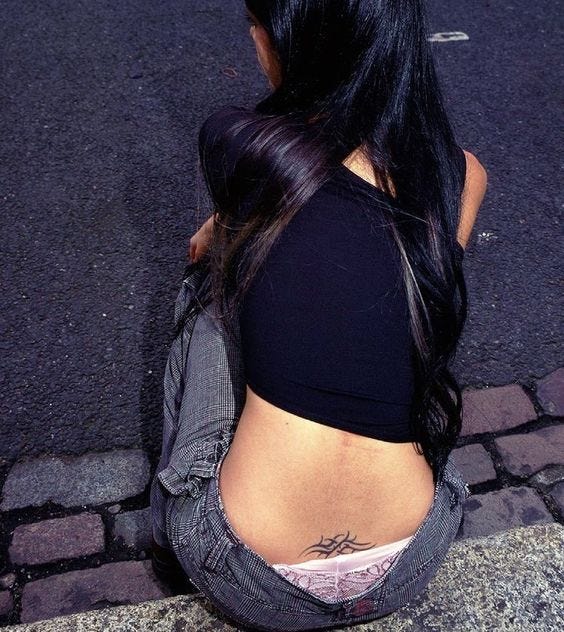
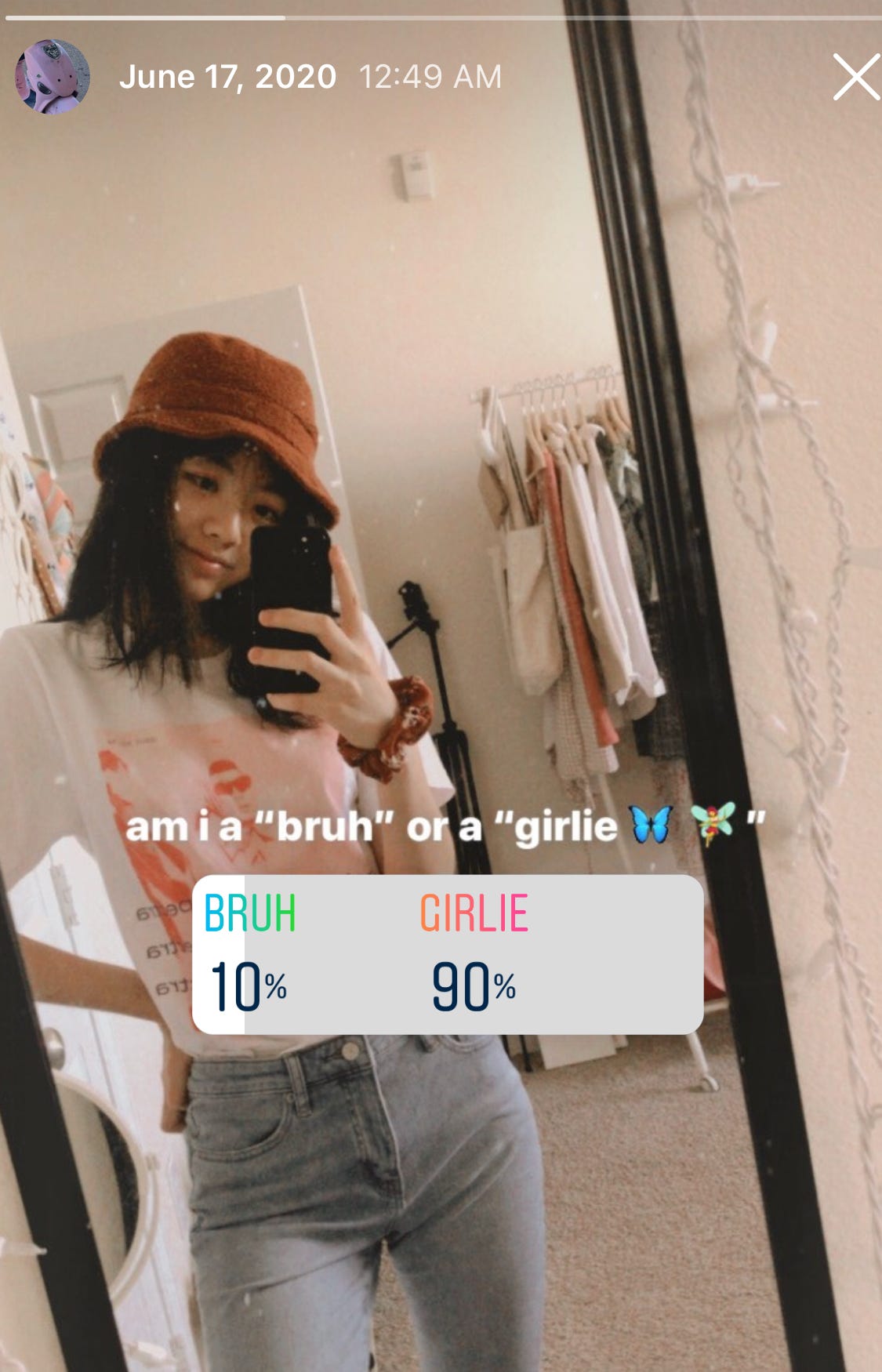

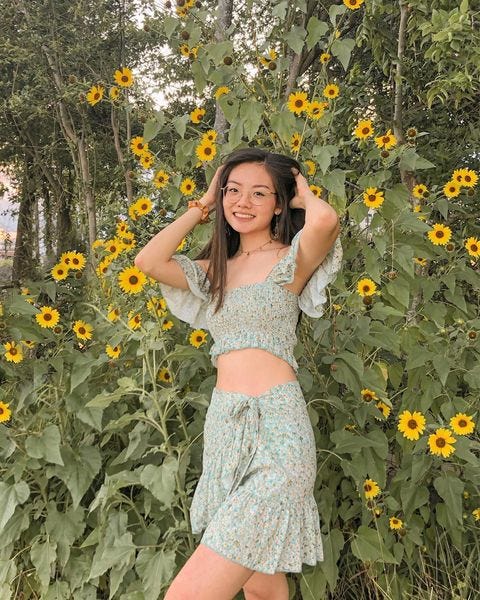
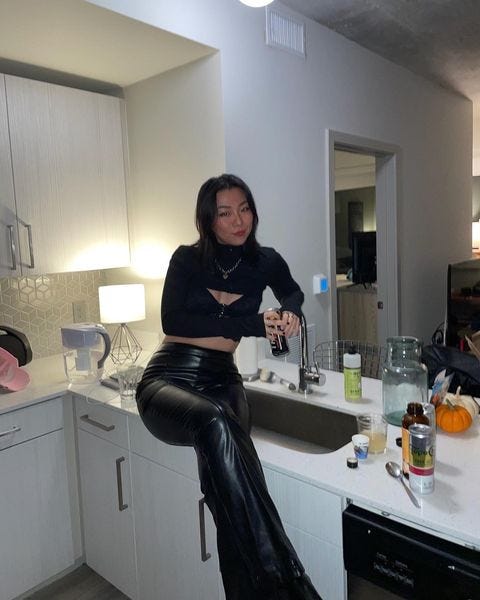
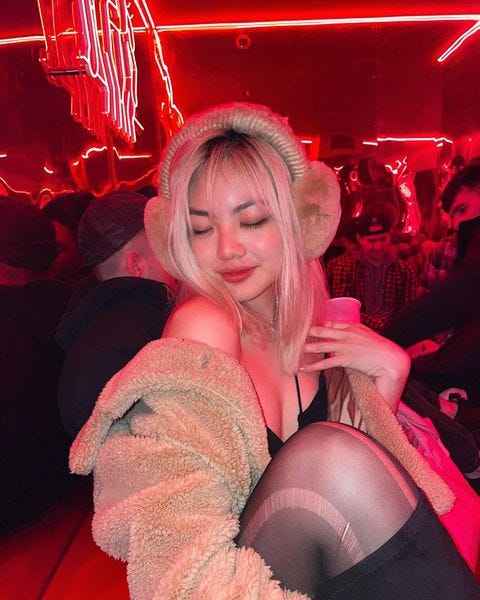
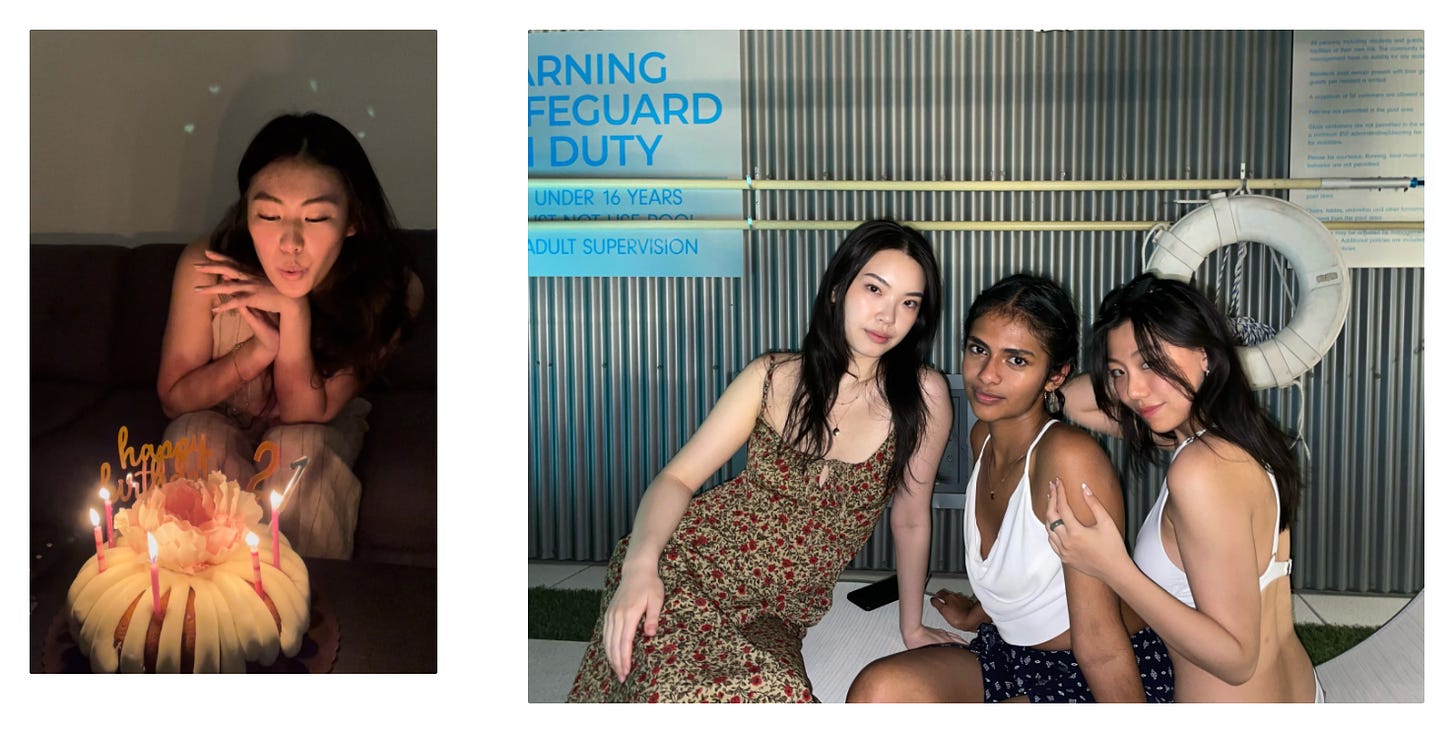
I understand myself a little better now, I LOVED this one <3